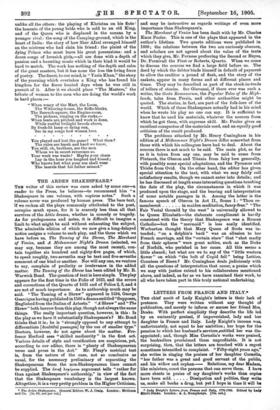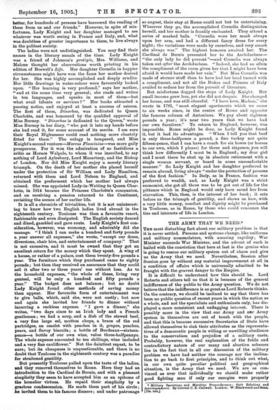THE chief merit of Lady Knight's letters is their lack
of pretence. They were written without any thought of publication, and merely to inform or amuse her friend Mrs. Drake. With perfect simplicity they describe the life led by an eminently genteel, if impoverished, lady and her daughter in France and Italy. Lady Knight's income was, unfortunately, not equal to her ambition; her hope for the pension to which her husband's services untitled her was dis- appointed; and, though Miss Cornelia's works were praised, the booksellers proclaimed them unprofitable. It is not surprising, then, that the letters are touched with a regret sometimes intensified to complaint. " Fifty-eight years ago," she writes in singing the praises of her daughter Cornelia, " her father was a great and good servant of the public, and his widow and orphan— Relations, my dear Madam, like ministers, court the persons that can serve them. I have more sheets in praise of my daughter's works than copies have been sold. Dissipation and politics, they write us, make all books a drug, but yet I hope in time it will be • Lady Knight's Letters from France and Italy, 1778-1798. Edited by Lad, Rhott-Drake. London : A. L. Humphreys. [Mss. net.]
better, for hundreds of persons have borrowed the reading of them from us and our friends." However, in spite of mis- fortunes, Lady Knight and her daughter managed to see whatever was worth seeing in France and Italy, and, what was doubtless of greater importance to them, to live always in the politest society.
The ladies were not undistinguished. You may find their names in the literary annals of the time. Lady Knight was a friend of Johnson's protegee, Mrs. Williams, and Malone thought her observations worth printing in his edition of Boswell's Life. Her daughter Cornelia in happier circumstances might have won the fame her mother desired for her. She was highly accomplished and deeply erudite. Her little drawings in water-colour were favourably looked -upon. " Her learning is very profound," says her mother, "and at the same time very general ; she reads and writes in ten languages, and speaks in most of them—but what avail talents or services ? " Her books attracted a passing notice, and enjoyed at least a success of esteem. The first of them, Dinarbas, was dedicated to Queen Charlotte, and was honoured by the qualified approval of Miss Burney. "Dinarbas is dedicated to the Queen," wrote Miss Burney in her diary, " who put it into my hands before she had read it, for some account of its merits. I am sure their Royal Highnesses could read nothing more chastely fitted for them." The eulogy is tempered, and Miss Knight's second venture—Marcus F7aminius—was more gaily prosperous. For it won the admiration of so fastidious a critic as Horace Walpole, to whom it was inscribed, to say nothing of Lord Aylesbury, Lord Macartney, and the Bishop of London. Nor did Miss Knight enjoy a merely literary triumph. On the death of her mother she placed herself under the protection of Sir William and Lady Hamilton, returned with them and Lord Nelson to England, and obtained the preferment which her mother had always missed. She was appointed Lady-in-Waiting to Queen Char- lotte, in 1814 became the Princess Charlotte's companion, and on receiving a pension returned to the Continent, revisiting the scenes of her earlier life.
It is all a chronicle of trivialities, but it is not uninterest- ing to know how two English ladies lived abroad in the eighteenth century. Toulouse was then a favourite resort, fashionable and even dissipated. The English society danced and dined, gambled and gave routs. Lady Knight's first con- sideration, however, was economy, and admirably did she manage. "I think I can make a hundred and forty pounds a year answer all expenses," she wrote, "except our dress, diversions, chair hire, and entertainment of company." That is not excessive, and it must be owned that they got an excellent return for the money which they spent. A wing of a house, or rather of a palace, cost them twenty-five pounds a year. The furniture which they purchased came to eighty pounds ; but then they received an assurance that they could sell it after two or three years' use without loss. As to the household expenses, " the whole of these, living very genteel, will be only a hundred and fifty pounds a year." The budget does not balance ; but no doubt Lady Knight found other methods of saving money than appear. Her favourite form of entertainment was to give balls, which, said she, were not costly ; but now and again she invited her friends to dinner without incurring a reckless expense. " I gave a dinner," she writes, "two days since to an Irish lady and a French gentleman ; we had a soup, and a dish of the stewed beef, a very fine large eel, mutton chops, a brace of the red partridges, an omelet with peaches in it, grapes, peaches, pears, and Savoy biscuits ; a bottle of Bordeaux—sixteen- pence—a bottle of our own wine, value three-halfpennys. The whole expense amounted to ten shillings, wine included and a very fine cauliflower." Not the daintiest repast, to be sure; but its cheapness is unquestionable, and there is no doubt that Toulouse in the eighteenth century was a paradise for straitened gentility.
But presently Toulouse palled upon the taste of the ladies, and they removed themselves to Rome. Here they had an introduction to the Cardinal de Berths, and with a pleasant simplicity they seem to have accepted him as an epitome of the homelier virtues. He repaid their simplicity by a gracious condescension. He made them part of his circle ; lie invited them to his famous dinners ; and under patronage so august, their stay at Rome could not but be entertaining. Wherever they go, the accomplished Cornelia distinguishes herself, and her mother is frankly enchanted. They attend a series of masked balls. " Cornelia wore her mask always upon her arm, and had a different fancy dress for every night; the variations were made by ourselves, and very smart she always was." The highest honours awaited her. The Cardinal de Bernie presented her to the Archduchess- " the only lady he did present "—and Cornelia was always taken out after the Archduchess. " Indeed, she had so often the compliment of the room given her that I might have been afraid it would have made her vain." But Miss Cornelia was made of sterner stuff than to have had her head turned with a compliment, and not all the Dukes and Princes of Italy availed to seduce her from the pursuit of literature.
But misfortune dogged the steps of Lady Knight. Her small income grew less, yet she did not despair. She changed her house, and was still cheerful. "I have here, Madan]," she wrote in 1781, "most elegant apartments which we came to six weeks since, in the centre of Rome and opposite the famous column of Antoninus. We pay about eighteen pounds a year ; it's near two years that we have had our own furniture." To return to England, however, was impossible. Rome might be dear, as Lady Knight found it, but it had its advantages. " When I tell you that beef is only three-halfpence a pound, a fine turkey not quite fifteen-pence, that I can have a coach for six hours (or horses to our own, which I please) for three and sixpence, you will think how differently I must be in England ; my dear girl and I must there be shut up in absolute retirement with a single woman servant, or board in some uncomfortable manner." So Lady Knight and her daughter preferred to remain abroad, living always "under the protection of persons of the first fashion." In Italy, as in France, fashion was preferred to wealth, and, as Lady Knight was a strict economist, she got all there was to be got out of life for the pittance which in England would only have saved her from starvation. This, then, is the interest of her book ; it sets before us the triumph of gentility, and shows us how, with a very little money, comfort and dignity might be purchased in Toulouse, as in Rome, by those who could renounce the ties and interests of life in London.
THE ARMY THAT WE NEED.*











































 Previous page
Previous page